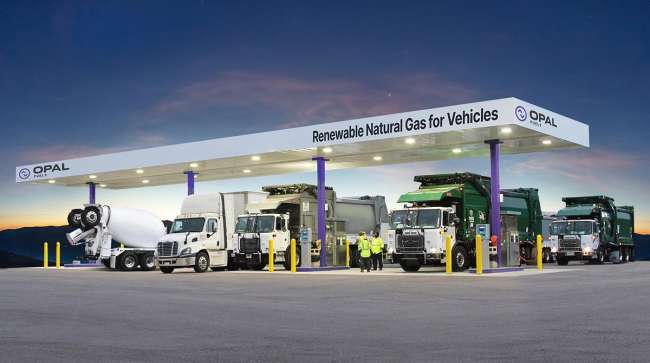Staff Reporter
Trucking Interests Ask Biden to Reduce Emission Rule

[Stay on top of transportation news: Get TTNews in your inbox.]
Florida and Pennsylvania truckers joined with over 100 groups nationwide with shared transportation interests that asked President Joe Biden to reverse his administration’s federal tailpipe emissions regulations for light-, medium- and heavy-duty vehicles.
“Our organizations represent diverse businesses throughout the transportation sector that collectively employ millions of Americans,” noted a July 11 letter to Biden.
It shared their concerns over the U.S. Environmental Protection Agency’s proposed Greenhouse Gas Emissions Standards for Heavy-Duty Vehicles in Phase 3 and Multi-Pollutant Emissions Standards for Model Years 2027 and Later Light-Duty and Medium-Duty Vehicles.
State organizations were from Alaska, Arizona, Arkansas, Colorado, Connecticut, Florida, Georgia, Hawaii, Idaho, Illinois, Indiana, Iowa, Kansas, Kentucky, Louisiana, Nebraska, Nevada, New Hampshire, New Jersey, New Mexico, New York, North Carolina, North Dakota, Maine, Maryland, Michigan, Minnesota, Mississippi, Missouri, Montana, Ohio, Pennsylvania, Rhode Island, South Carolina, South Dakota, Tennessee, Texas, Utah, Vermont, Virginia, Washington state, West Virginia, Wisconsin and Wyoming.
“EPA’s proposals inhibit the marketplace from identifying the most efficient, lowest cost opportunities to reduce GHG [greenhouse gas] emissions from vehicles and greatly restrict consumer choice. We are concerned that such a prescriptive policy is not in the best interest of the consumer or of U.S. energy and economic security,” the letter noted.
The letter contended that EPA’s approach fails to consider future emission reductions by accelerating the turnover of existing fleets to advanced diesel technology and using more renewable fuels to improve vehicle emissions faster and at a much lower cost while zero-emission heavy-duty electric and fuel cell vehicles as well as infrastructure are being developed, tested and deployed.
“Improved crop yield, innovative biofuel and refined product processing, and manufacturing efficiency tied with carbon capture each represent promising advancements for current liquid and gaseous fuels to continue to accelerate emissions reductions,” the letter noted.
Furthermore, it called the EPA’s heavy-duty vehicle proposed regulation a nontraditional way to lower emissions since it requires “driving the penetration” of new zero-emission vehicles like battery-electric vehicles into the marketplace.
“Pursuing a broader range of emissions-reducing transportation pathways can also help guard against an over-reliance on foreign adversaries and volatile global supply chains associated with critical minerals that are necessary for rapid expansion of electric vehicle markets,” the letter said.
It was also signed by state and national agricultural groups, petroleum marketers and fuel dealers, refiners, convenience store and truck stop operators, the Florida Trucking Association and Pennsylvania Motor Truck Association.

Oyler
Rebecca Oyler, PMTA president, told Transport Topics that EPA’s rules will do more harm than good for its members and the trucking industry by limiting choice in a rush to mandate unproven technologies lacking the infrastructure and supply chain to support them.
“Pennsylvania is proud to be the state with the third highest percentage of new-technology, clean diesel trucks on the road at 66%,” Oyler said. “PMTA members should be able to choose the type of technology that works best for them, thereby focusing private investment in the best solutions. For many companies, clean diesel, near-zero-emission trucks may be the answer. Ensuring that these trucks are affordable and available will do more to reduce emissions while maintaining America’s essential supply chains than EPA’s proposed rules.”
Other signatories on the letter from her state included the Pennsylvania Chamber of Business and Industry, Pennsylvania Farm Bureau, Associated Pennsylvania Constructors, Pennsylvania Food Merchants Association, Pennsylvania Manufacturers’ Association and three state groups affiliated with oil and gas interests.
Florida also had several groups adding their names to the letter such as the Florida State Hispanic Chamber of Commerce and the Associated Industries of Florida.

Miller
“Trucking in Florida is not a monolith — the almost 130,000 companies with one or more trucks all have different needs and best practices for operating. We are committed, as we have been, for decades, to decrease emissions. But there is no one-size-fits-all,” declared Alix Miller, FTA president. “We are almost entirely dependent on our Florida ports for fuel — they move our trucks and economy. But we support all options for our industry — that means electric, CNG [compressed natural gas], hydrogen, biodiesel and diesel to keep our supply chain healthy as technologies evolve.”
Among the agricultural groups asking for Biden’s assistance were the American Farm Bureau Federation, Agricultural Retailers Association, Connecticut Farm Bureau Association and National Corn Growers Association.
Also, the American Highway Users Alliance, American Petroleum Institute, Truck Renting and Leasing Association, Renewable Fuels Association, Utility and Transportation Contractors Association of New Jersey, Business & Industry Association of New Hampshire, Illinois Manufacturers’ Association, Natso, National Association of Convenience Stores (and several convenience store groups from various states) as well as the U.S. Chamber of Commerce and multiple state chambers of commerce.
Want more news? Listen to today's daily briefing above or go here for more info
“We share the goal of reduced greenhouse gas emissions across the broader economy and, specifically, those from energy production, transportation and use by society. We support federal policies that accomplish these goals and believe it is critical to preserve consumers’ access to affordable, reliable and efficient transportation,” the letter noted. “Our organizations have worked with EPA on numerous regulatory programs to successfully reduce emissions across the transportation sector. We urge your administration to reconsider these proposals from EPA to better allow for emissions reductions from a myriad of vehicle and fuels technologies and strategies to be realized while meeting Americans’ transportation needs.”




